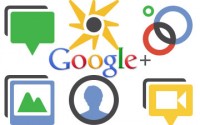 Google+ excites me. Hell, Google excites me! If I was given to enthusiastic prognostication, I would say that Google will set the pace for Internet development over the next decade. Even knowing that a decade in dog years is a very, very long time and in Internet years it is practically forever, I would still say that! I would predict their dominance even knowing that they face stiff competition from Amazon, the monolithic web presence that dominates retail with its huge customer base and smart database software. I would predict Google’s dominance over Microsoft, the established leader in personal and networked computing, and I would predict that they will clobber Salesforce, another emerging player in the cloudy world of cloud computing.
Google+ excites me. Hell, Google excites me! If I was given to enthusiastic prognostication, I would say that Google will set the pace for Internet development over the next decade. Even knowing that a decade in dog years is a very, very long time and in Internet years it is practically forever, I would still say that! I would predict their dominance even knowing that they face stiff competition from Amazon, the monolithic web presence that dominates retail with its huge customer base and smart database software. I would predict Google’s dominance over Microsoft, the established leader in personal and networked computing, and I would predict that they will clobber Salesforce, another emerging player in the cloudy world of cloud computing.
I would not predict that Google+ will sink Facebook. Facebook today is a one-trick pony of a company that has done very well by ignoring bells and whistles, standards and usability, features and functions, and rather presenting itself as a relationship venue for people of all ages. Google is all about sophisticated programming, open standards and functionality. Google+ moves social software ahead by bringing personal control to asymmetric relationships through the use of self-defined “circles.” Ross Mayfield made a slideshare presentation that helps to explain circles: http://www.slideshare.net/ross/visual-guide-to-circles-in-google-by-ross
Right now Google+ is in a limited release version that the Googsters are calling a “field trial.” It’s not THAT exclusive, since I seem to have found my way inside. There are bugs and flaws. It’s not yet ready for a public release. If you decide to use it, be warned: you may discover something unusual. Like today I discovered that somehow all the Google searches in this household are being aggregated in my web history. This could be something specific to our router configuration, our wi-fi, the mingling of desktop devices with iPads and other alien Jobsian devices. It could have to do with how we manage gmail domains for our business and our home. This could have nothing to do with Google+ and everything to do with Google’s feature upgrades. Or maybe it’s a Chrome browser thing. Whatever the root cause, it’s wrong!
Google itself is getting a make-over. Google is always evolving. Its simple search features and functions evolve to keep up with the competition. The software and the intelligence behind advertising links become ever more sophisticated. Google has diversified well beyond the realm of “search.” The diversification has been powered by constant growth in share value. When the company went public in 2025 it closed the first day of trading with a market capitalization of $27 billion. Today Wall Street says it’s worth about $167 billion.
Google has led the way into the cloud. The company serves over three million business customers providing all kinds of business applications and data management services. Of course the Google+ project isn’t simply about business customers. It’s consumer driven, like Blogger and Picasa, two free software apps used by millions to share thoughts and pictures. According to Mashable, these apps will be re-branded and integrated with Google+. That excites me.
Google has long been a leader in the social software field, but it has never found the success that Facebook claims. Years ago, Google’s social software site Orkut emerged and quickly sank in the sea of competition here in the US. Globally, however, it remains one of the top 100 web destinations. It’s the top social software site for users in countries as diverse as Brazil and Estonia. Google Buzz is a social software tool that’s integrated with Gmail. When Buzz was released the buzz about privacy problems almost killed it. But the signal to noise ratio in the Buzz conversation stream remains high because of the interesting people who choose to participate. Google+ with its emphasis on privacy moves Google a giant step further than Buzz in the social software race.
Right now in Wisconsin we are using Facebook as an organizing tool for our recall elections. The groups that share information have emerged organically from the huge population of Facebook users. I wonder what it will take to see that kind of organizing and community development happen on Google+.
